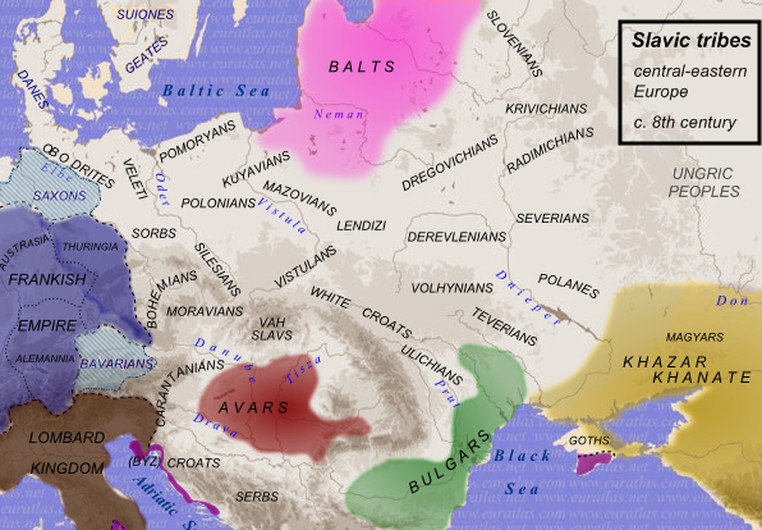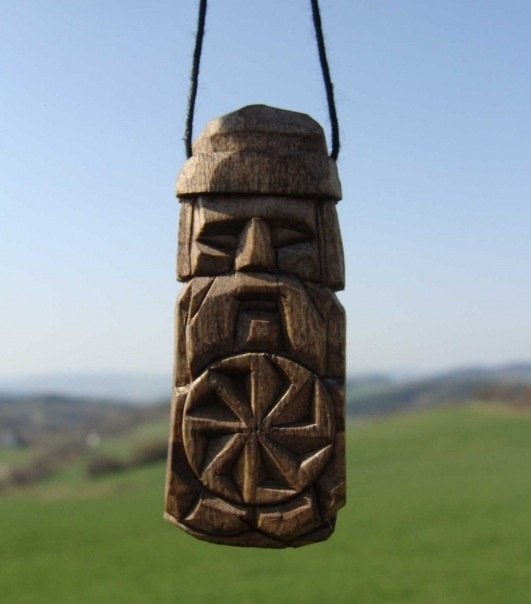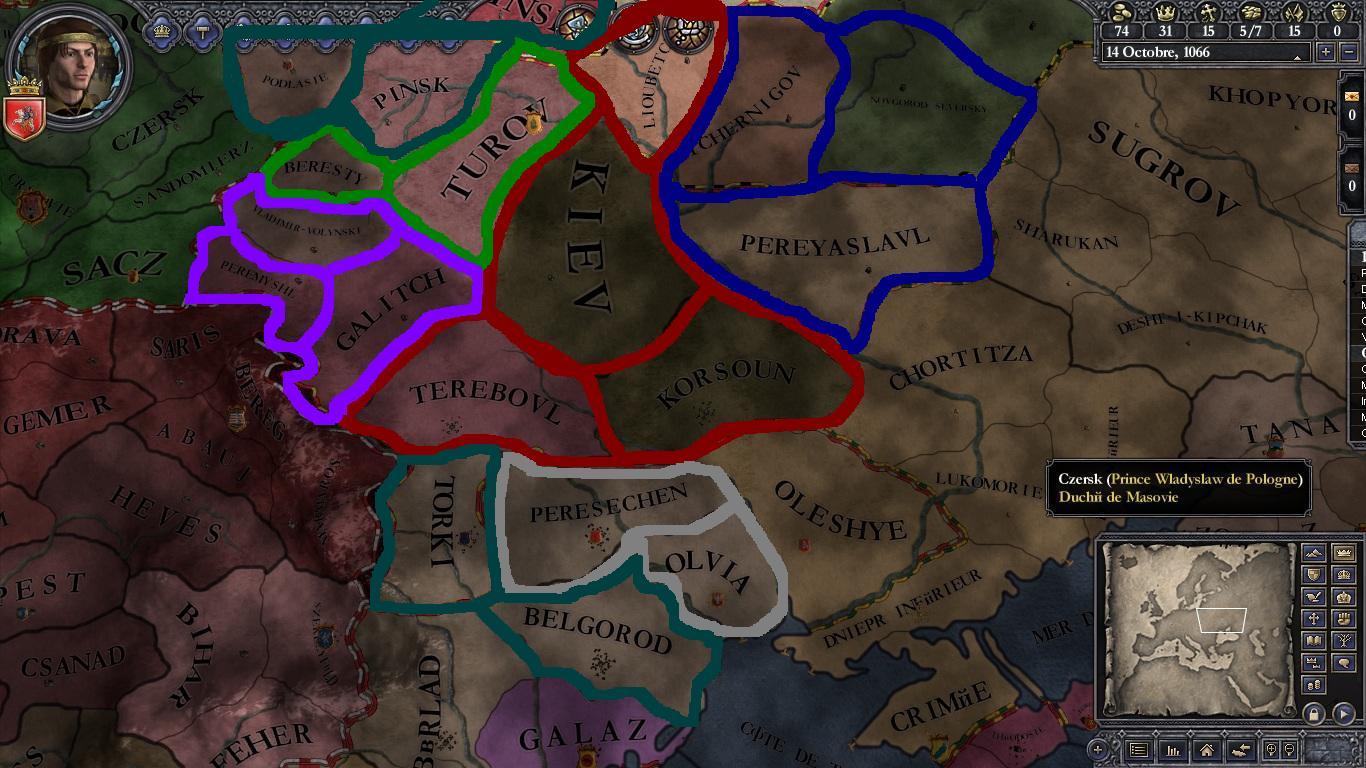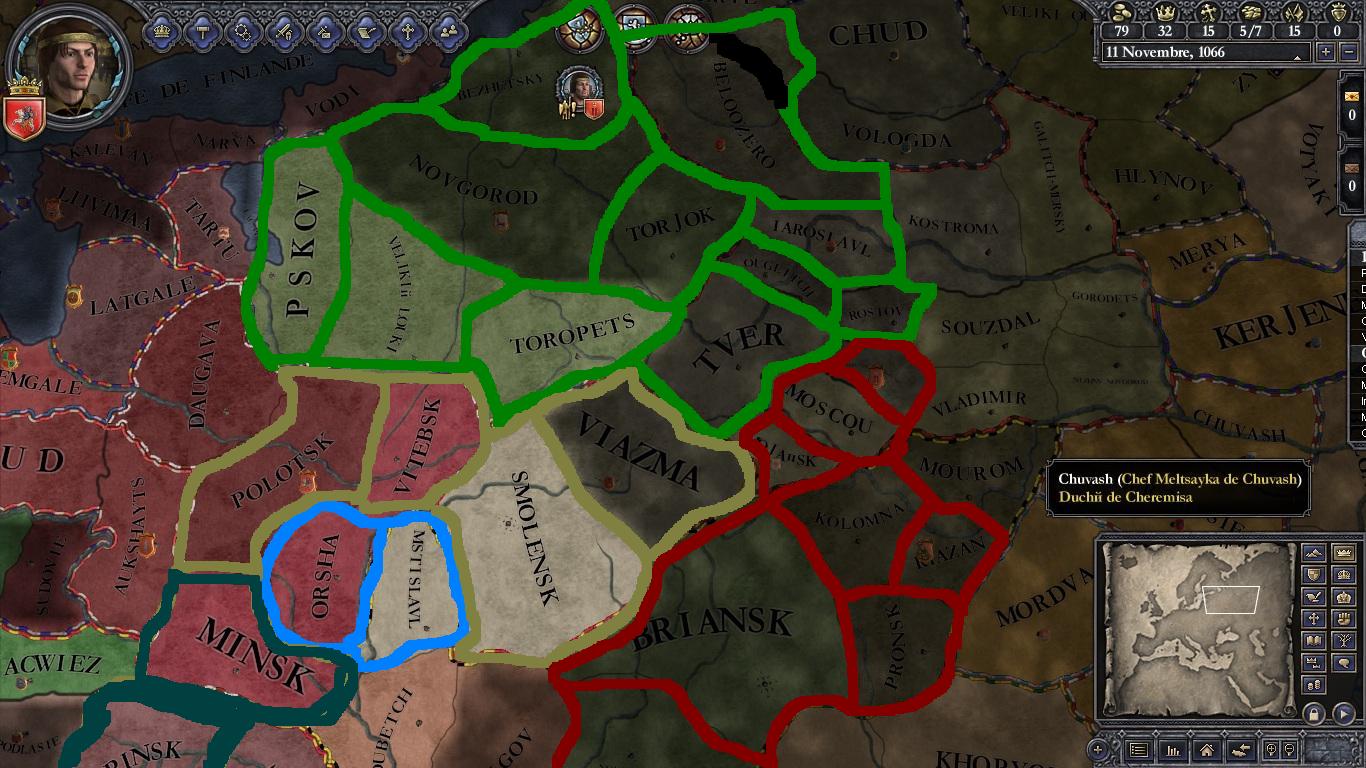
Slavonic Gods
- Thread starter unmerged(606777)
- Start date
-
We have updated our Community Code of Conduct. Please read through the new rules for the forum that are an integral part of Paradox Interactive’s User Agreement.
You are using an out of date browser. It may not display this or other websites correctly.
You should upgrade or use an alternative browser.
You should upgrade or use an alternative browser.
I like "Slavianstvo" specially since "slava" (at least in modern languages) means "glory" or "celebration". Where in the old days, for example, my Serbian ancestors would celebrate one of the Slavic gods (a chosen deity), today, in Christian tradition, basically the same thing lives on - only instead of pagan gods, we now have patron saints, which we celebrate once a year (it can last for a number of days) and this whole thing is still, surprisingly, called "slava". Not to mention all the merging of old beliefs with Christianity.
Same thing here
What was the day of Perun is now St. Elija the Thunderer, Mokosh day is now Saint Paraskevi of Iconium day, Veles day is now Saint Vlasios (Blaise), Yarilo's day - St. Nicholas of the Spring day, Kupala's day - St. John the Baptist day and so on.
@Nuril
thnx, m8
Last edited:
Somehow it's only now I realised that the devs will have to add a good lot of new tribes and political entities into the game


I wonder what pictogram would the devs choose for Slavonic Paganism.
Among the most authentic ones, should probably be the so called "thunder sign":

Or a poverbial "Kolovrat"

The Axe of Perun ("Perunova Sekira") would be cool too:

Among the most authentic ones, should probably be the so called "thunder sign":

Or a poverbial "Kolovrat"

The Axe of Perun ("Perunova Sekira") would be cool too:

I like "Slavianstvo" specially since "slava" (at least in modern languages) means "glory" or "celebration". Where in the old days, for example, my Serbian ancestors would celebrate one of the Slavic gods (a chosen deity), today, in Christian tradition, basically the same thing lives on - only instead of pagan gods, we now have patron saints, which we celebrate once a year (it can last for a number of days) and this whole thing is still, surprisingly, called "slava". Not to mention all the merging of old beliefs with Christianity.
The word "Slavic" or "Slavianism" does not derive from the Slavic word for glory but the Slavic word for "word". "Slavs" are "people of the word" (i.e. people who speak the language, i.e. the people one can understand). As a counterpoint, in Polish for example Germans are called "Niemcy", i.e., literally the "mute people" - because their language was not understood by Slavs.
Oh man, I want to play as a slavonic pre-Poland tribe to create my own Poland and play through the game.. OH I WANT THIS SO BADLY
I think it should simply be called "Slavic", like the religion of the Norsemen is called "Norse". Using neopagan terms like Romuva or Suomenusko only leads to facepalms from native speakers. I wouldn't mind, however, if Paradox failed their research and called the Slavic religion "dolboslavie". That would be hilarious.
The word "Slavic" or "Slavianism" does not derive from the Slavic word for glory but the Slavic word for "word". "Slavs" are "people of the word" (i.e. people who speak the language, i.e. the people one can understand). As a counterpoint, in Polish for example Germans are called "Niemcy", i.e., literally the "mute people" - because their language was not understood by Slavs.
Old Slavic word for "word" is "slovo" (in modern Serbian it means "letter" not "word"). And yes what you mentioned is one of the theories, but we just dont know for certain. At the same time "slava" (as such) in Serbian (and Russian i believe) can mean "glory" (Slava Rossiyi - glory to Russia), and "slaviti" (in Serbian at least) means "to celebrate" / and can even mean "to worship" (as slava is, i believe, a unique Orthodox tradition of celebrating family patron saint), which is a direct merger of old pagan tradition and orthodox christiantiy, as far as i know, the Catholic Slavs (like Czechs, Poles, Croats etc) dont have that.
http://www.pcgamer.com/2013/02/05/crusader-kings-ii-the-old-gods-everything-we-know-so-far/
Yee-haw! Slavonic Paganism confirmed. Devs <3
Yee-haw! Slavonic Paganism confirmed. Devs <3
I think it should simply be called "Slavic", like the religion of the Norsemen is called "Norse". Using neopagan terms like Romuva or Suomenusko only leads to facepalms from native speakers.
You mean how like it's almost always non-Scandinavians which strenuously object to the "neo-pagan" terms such as Ásatrú which I support? Since all it really means is "Belief in the Gods" and the only contemporary terms are basically "Not-Christian", which obviously isn't great for this. It's used in our language to also speak about what they believed back then, coined during the Romantic period when they wanted it's own label for it, despite not being neo-pagans themselves.
It gets especially silly now that they'll be including a Norse culture (as they should, since the split shouldn't be happening until at least 1250, but they'll probably only have it for 867..), since then it'll be a "Norse Norse" character, when it could just be "Norse Ásatrú, Norse Catholic, etc".
I does indeed sucks to live in anglo-germo-western-northren centric world, I know more about other people's history then that of my own, sources and poplar references and even "coolnes" of it all is almost nonexisting. Who would have thought one can learn so much from playing a "game". And that Germans = mutes is so right and fascinating since it's right there in their Slavic name (I use it and listen to it on daily basis) and I never thought about it, but it's just says friggin that!
Also, Slavonic and/or Slavic.. which is right (when using English language), or are the both fine, since I find Slavonic maybe too "close" to being referred to people from Slavonia (guess they would be Slavonians?)
Also, Slavonic and/or Slavic.. which is right (when using English language), or are the both fine, since I find Slavonic maybe too "close" to being referred to people from Slavonia (guess they would be Slavonians?)
The initial ancient word was "Slovene" (meaning the ones, knowing words) for the ethnic group, "Sloven/Slovenka" for a person. Hence Germanic "Wends" for West Slavs and Finnic "Venelainen, Venemaa" for Russians and Russia.
And this confusion between Slovaks, Slovenians, Slovinians, Slavonians and Novgorodian Slovene, it's just local variants of the same name. It's fascinating that we managed to retain basically the same name from Alps to Novgorod, despite the crazy distances and the lack of a regulated writing system.
To me the most correctly sounding adjective for the whole Slavic superetnos would be "Slovenic".
And this confusion between Slovaks, Slovenians, Slovinians, Slavonians and Novgorodian Slovene, it's just local variants of the same name. It's fascinating that we managed to retain basically the same name from Alps to Novgorod, despite the crazy distances and the lack of a regulated writing system.
To me the most correctly sounding adjective for the whole Slavic superetnos would be "Slovenic".
At least one of the Muslim sources about the Rus describes them as Christians before the official conversion date. They may have been lying since being Christian gave you benefits when trading in Baghdad, but its more likely that there was a mixed Pagan and Christian population for at least a century before everyone officially became Christian as that's how it worked in better documented areas.
At least one of the Muslim sources about the Rus describes them as Christians before the official conversion date. They may have been lying since being Christian gave you benefits when trading in Baghdad, but its more likely that there was a mixed Pagan and Christian population for at least a century before everyone officially became Christian as that's how it worked in better documented areas.
Even if that's the case: "Mixed" population generally means "A couple of percent in the cities and entirely pagan country-sides", though, not some even split or anything. Just as how there were a handful of Christians in Birka via the mission of Ansgar in the 800s, but it was an insignificant amount that didn't carry on past a single generation and didn't spread outside of that one congregation.
Okay, that PC Gamer interview was revealing in many aspects.
As for the Slavonic tribes in 867, allow me to share some thoughts.
There should be 3 major culture groups of Slavs:
Western Slavonic, including the following tribes (and their capital):
- Obodriti (Arkona)
- Lutichi (Szczecyn)
- Pomeranians (Wolin)
- Lusatians (Dresdany, later known as Dresden)
- Czechs (Praha)
- Moravians (Velehrad)
- Slovaks (Nitra)
- Polans (Gniezno)
- Vislians (Krakow)
- Kujawians (Bydgoszcz)
- Mazurians (Plock)
- Silesians (Vratislav)
East Slavonic:
- Slovene (Novgorod)
- Krivichi (Smolensk)
- Radimichi (Gomel')
- Viatichi (Dedoslavl')
- Poliane (Kiev)
- Drevliane (Iskorosten')
- Dregovichi (Turov)
- Severians (Chernigov)
- Volynians (Galich)
- Ulichians (Peresechen')
- Tiverians (?)
South Slavonic:
- Horutane
- Croats
- Serbs
- Bulgarians (or should we make several pre-Bulgar tribes?)
- ?
South Slavic brothers, share your thoughts, as I don't know much about your history yet.
As for the Slavonic tribes in 867, allow me to share some thoughts.
There should be 3 major culture groups of Slavs:
Western Slavonic, including the following tribes (and their capital):
- Obodriti (Arkona)
- Lutichi (Szczecyn)
- Pomeranians (Wolin)
- Lusatians (Dresdany, later known as Dresden)
- Czechs (Praha)
- Moravians (Velehrad)
- Slovaks (Nitra)
- Polans (Gniezno)
- Vislians (Krakow)
- Kujawians (Bydgoszcz)
- Mazurians (Plock)
- Silesians (Vratislav)
East Slavonic:
- Slovene (Novgorod)
- Krivichi (Smolensk)
- Radimichi (Gomel')
- Viatichi (Dedoslavl')
- Poliane (Kiev)
- Drevliane (Iskorosten')
- Dregovichi (Turov)
- Severians (Chernigov)
- Volynians (Galich)
- Ulichians (Peresechen')
- Tiverians (?)
South Slavonic:
- Horutane
- Croats
- Serbs
- Bulgarians (or should we make several pre-Bulgar tribes?)
- ?
South Slavic brothers, share your thoughts, as I don't know much about your history yet.
I'm hesitant to over-tribalize certain parts of the eastern Slavic lands, especially the people living around modern-day Velikiy Novgorod. Admittedly, it was founded not too long before the start date, assuming we're going with the theory that it was founded in the 9th century. Also, only a few years after the start date was when Oleg captured Kiev.
All of this, naturally, occurred while they were indeed tribal, but the Eastern slavs were on their way to transitioning out of such a system, as shown by the not-too-far away organized invasions and diplomatic movements in the 890s and early 900s.
As for the Southerners, pre-bulgar tribes in 867 would be entirely ahistorical. The first Bulgar empire had already existed prior to the start date, and Boris I had just began the elimination of Slavic paganism from his lands in 864, which is 3 years from the start date. Regarding the Serbs and other southern slavics I am totally unsure.
All of this, naturally, occurred while they were indeed tribal, but the Eastern slavs were on their way to transitioning out of such a system, as shown by the not-too-far away organized invasions and diplomatic movements in the 890s and early 900s.
As for the Southerners, pre-bulgar tribes in 867 would be entirely ahistorical. The first Bulgar empire had already existed prior to the start date, and Boris I had just began the elimination of Slavic paganism from his lands in 864, which is 3 years from the start date. Regarding the Serbs and other southern slavics I am totally unsure.
East Slavic tribes, as they should be.

Bottom to top:
Tivertsi [Torki, Belgorod]
Ulichi [Peresechen', Olvia]
Poliane [Kiev, Lyubech, Terebovl', Korsun']
Volyniane [Galich, Peremyshl', Vladimir-Volynsky]
Drevliane [Turov, Beresty]
Severiane [Chernigov, Pereyaslavl', Novgorod-Severskiy]
Dregovichi [Minsk, Pinsk, Podlasie]

Viatichi [Kolomna, Bryansk, Mojaisk, Moskva, Pereyaslavl'-Zalesskiy, Riazan', Pronsk]
Radimichi [Orsha, Mstislavl']
Krivichi [Smolensk, Polotsk, Vitebsk, Viazma]
Slovene or the original Rus' state. [Novgorod, Pskov, Velikiye Luki, Toropets, Bezhetskiy Verkh, Torzhok, Belo Ozero, Tver, Yaroslavl', Ouglich, Rostov]
Bottom to top:
Tivertsi [Torki, Belgorod]
Ulichi [Peresechen', Olvia]
Poliane [Kiev, Lyubech, Terebovl', Korsun']
Volyniane [Galich, Peremyshl', Vladimir-Volynsky]
Drevliane [Turov, Beresty]
Severiane [Chernigov, Pereyaslavl', Novgorod-Severskiy]
Dregovichi [Minsk, Pinsk, Podlasie]
Viatichi [Kolomna, Bryansk, Mojaisk, Moskva, Pereyaslavl'-Zalesskiy, Riazan', Pronsk]
Radimichi [Orsha, Mstislavl']
Krivichi [Smolensk, Polotsk, Vitebsk, Viazma]
Slovene or the original Rus' state. [Novgorod, Pskov, Velikiye Luki, Toropets, Bezhetskiy Verkh, Torzhok, Belo Ozero, Tver, Yaroslavl', Ouglich, Rostov]
Last edited:
Just came to say that fire breathing unicorn-bull thing looks awesome.
Thanks, mate.
Comments like that are appreciated and help keeping this thread on page 1
I'm hesitant to over-tribalize certain parts of the eastern Slavic lands, especially the people living around modern-day Velikiy Novgorod.
Well, I tried to minimize it. Hence no Polochians or Pskovian Kriviches

